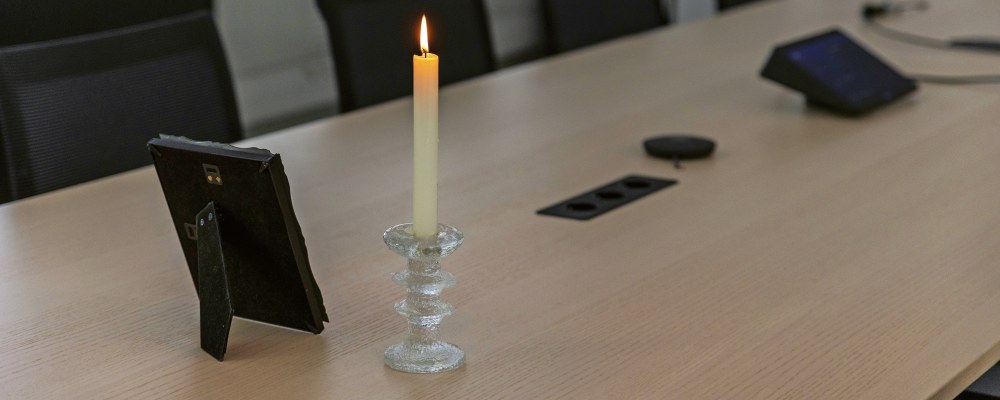
What can you say to a colleague who has lost a loved one? When faced with death, we are often lost for words. Specialist Sirpa Mynttinen from the Surevan kohtaaminen project says that giving your condolences, which is an established part of Finnish culture, is often a good start. If you are close to the colleague, you can also show compassion by giving them a hug without saying anything. However, even more important than words is not leaving the grieving person alone simply because you do not know what to say.
“There are no words or actions that will make the other person’s grief feel any easier. You can also tell them that you don’t know what to say. That you’ve heard what happened and that you are sorry for their loss,” Mynttinen says.
Mynttinen says that bereaved people often feel offended if their loss is ignored completely. But when it comes to supporting a grieving colleague, the best approach depends on the bereaved person. Since people are different, our ways of grieving are also different. The clearest approach is asking the bereaved person directly how they would like to be treated and if they want to talk about their loss at work. It is up to the supervisor or the HR to do this. They should also ask the employee what information they want to share about their loss at work and with whom.
Business Process Specialist Katja Nokkanen from the steel company SSAB lost her father due to an assault near the beginning of her career. Her father was walking home when a total stranger hit him. Her father fell down and died of the cerebral haemorrhage caused by the incident. The perpetrator turned themselves in to the police.
“My absence from work was unexpected, but my workplace was immediately on top of the situation. During my absence, I did not have to answer any work-related questions, nor did I feel rushed to get back to work. I felt I was given room to process what had happened,” says Nokkanen.
She believes that, especially in Finland, people respect each other’s personal space and keep a polite distance to others. However, a bereaved person can feel like others are trying to avoid them.
“It’s the little things, like inviting you for lunch or chatting casually, that mean a lot. These gestures show the grieving person that even though many things are out of place in the world right now, some things are as they should be,” says Nokkanen.
A plan helps in a crisis
Sirpa Mynttinen believes that every workplace should be prepared for the death of a colleague or the loved one of a colleague. A good crisis plan includes the sick leave policy and the arrangements for returning to work. The plan should also name the people who are responsible for giving condolences and contacting the employee who has suffered a loss.
“Death is often unexpected and especially the death of a colleague will affect the entire work community. The situation is shocking to everyone, which is why it is a good idea to seek external professional help through occupational health care, for example,” says Mynttinen.
Architect Marja Väisänen lost her husband to disseminated bowel cancer just three weeks after he received a diagnosis. At the time, Väisänen was working for Rakennussuunnittelutoimisto Sormunen & Timonen Oy, which is now part of the building consulting company Sitowise. Following the death of her spouse, Väisänen took a week of sick leave with the diagnosis of an acute stress reaction.
“I kept busy that week, organizing the funeral and the burial plot and navigating the enormous bureaucratic tangle into which a person who has lost a loved one is thrown immediately after their loss,” she says.
Väisänen had asked her employer in advance to tell everyone at work about what had happened.
“Since Kuopio is a fairly small place, the news spread quickly to partners, which was a good thing, because I didn't have to keep explaining what had happened.”
After losing her father, Katja Nokkanen received flowers from her supervisor and condolences from her workplace.
“I probably haven't been able to say how much that gesture meant to me and how much I appreciated it.”
When a bereaved person returns to work
When Katja Nokkanen's father died, the only “crisis aid” she received was a one-week sick leave at her request. Nokkanen needed a second week of sick leave before she felt able to work again. She felt both relieved and distressed about returning to work.
“Getting back to my routines created a sense of normalcy, and my thoughts did not revolve around the loss all the time. I found it helpful to have to get out of bed, get dressed and get to the office every day. Nobody tried to ask me more than what I was willing to share. I appreciated that. Nobody recoiled from what I told them either.”
Marja Väisänen recalls that after her spouse died, work felt slow, like she was working at half her normal capacity. Concentrating on things was hard and she had trouble remembering things.
“Looking back at some of the designs I made at the time, there seems to be some sense in them. I was probably running on autopilot. Other people need to be patient, and the bereaved person should not be expected to put in a lot of effort right away.”
Väisänen recalls that most of her colleagues did not talk about the loss with her. When she walked into the break room, everyone went quiet.
“I’ve thought about what caused that silence. Perhaps I was a reminder of our mortality, about the fact that anything can happen.”
Nokkanen says that after her father's death, work and busy schedules lost their importance for some time. Sleeping, eating and hobbies felt inessential.
“Something irreversible had happened. What could possibly go more wrong, if this particular task did not get done this week?”
Nokkanen did not have the option of working remotely at the time. She believes that remote work would have made it easier to get back to work. Occupational health care could have also provided more help with returning to work.
“At first, you spend a lot of energy just getting through the day, and as you are grieving, you don't necessarily realize that help is available.”
Sirpa Mynttinen points out that the workplace and the supervisor play a big role in the coping of a bereaved person. All good workplaces have a return-to-work plan: Should the duties of the bereaved person be adjusted? Do they need more flexible working hours? What help can occupational health care provide? It is also important for the supervisor to monitor the implementation of the plan and occasionally ask how the bereaved person is doing. The supervisor is also responsible for making sure that the other employees are not overburdened due to the sick leave or the rearrangement of duties.
“It matters how a workplace supports people in crisis situations. People vote with their feet and, on the other hand, a good reputation spreads far and wide!”
More information: www.surevankohtaaminen.fi/en/a-bereaved-person-in-the-work-community/

How to support a bereaved colleague
- Respect the individuality of grief. Avoid comparisons like “I know how you feel, because I too lost...”.
- Don’t try to explain. Even if you mean well, the bereaved person may get upset if you say things like: “Luckily you have other children”, “It would be worse if your own mother had died” or “You’re still young, you’ll find a new partner”.
- Tolerate the other person's pain. This is a better option than trying to look for meaning or an explanation for the other person’s loss. Attempts to console someone by saying things like “this has probably given you a clear sense of your values” is not helpful.
- Invite the bereaved person along. If they refuse, invite them again the next time. Do not assume that the bereaved person does not have the energy or the will to participate. Bereaved people do not break and grief is not contagious.
- Avoid clichés. “Time heals all wounds” and “you need to be strong now” rarely give comfort. According to the modern view of grief, grief is not something you need to get over, but learn to live with.
- Say you are sorry if you feel you have said something inappropriate.
The tips are from Sirpa Mynttinen and experts by experience Katja Nokkanen (Huoma ry – for families of homicide victims) and Marja Väisänen (Nuoret Lesket ry – Young Widows and Widowers).
Collective agreement supports a bereaved person
Workplaces have various ways to make adjustments in exceptional situations, such as when an employee is grieving. The Employment Contracts Act contains a section on absence for compelling family reasons (chapter 4, section 7). The section entitles employees to temporary absence from work because of an unforeseeable reason, for example. Employees must notify the employer of their absence as soon as possible. The employee and the employer agree on the duration of the leave and on other arrangements (chapter 4, section 7 a). According to law, absence for a temporary reason is unpaid.
Several collective agreements for senior salaried employees negotiated by TEK provide better terms than the law for brief, temporary absences. Under these collective agreements, the sudden illness, accident, death or funeral of next of kin usually entitle the employee to a paid leave and the employee does not lose their annual holiday on these days. The number of days varies, depending on the collective agreement.
Workplaces covered by collective agreements can negotiate terms concerning temporary adjustments to the working hours and the duties of a bereaved employee that are even better than the terms in the collective agreement. This requires the shop steward to conclude a local agreement on the matter with the employer. Adjustments will reduce the risk of overburdening and occupational accidents for both the bereaved person and their colleagues.
Text by Sirkku Pohja, Work life expert, TEK